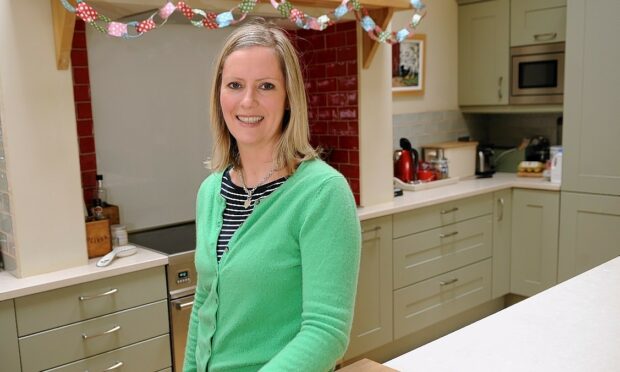The first column of the year is always a challenge to write, mainly because there is not all that much of note happening on the farm or on the milk processing side of the business. Even the school calendar and family wall planner are fairly quiet this month.
I guess it is all relative to this time last month in the frenetic run up to the festive season, which seems an unfathomably long time ago now.
Of course the daily jobs continue as usual, both in the farmhouse and on the farm, and Rosie is back making ice cream and yoghurt, but demand for our dairy produce is at its lowest in January.
We have not long re-opened the ice cream counter at Daviot after the Christmas holidays, and until March, it will only open at weekends as sales simply don’t justify the staffing costs.
The next push will be for Valentine’s Day when Rosie and the team will stock up on “romantic” gelato flavours such as chocolate fudge brownie, Ferrero Rocher, salted caramel, banoffee, Malteser and sorbets including prosecco and raspberry, as well as heart and flower shaped ice cream cakes.
In the meantime, we are thinking of ways to promote our new pots of natural yoghurt and are currently in talks with local “real meals” maker, Highland Cookhouse, about a collaborative layered tub of fruit compote, yoghurt and granola.
It would be a perfect partnership as we are not set up to produce compote or granola while Highland Cookhouse has a team of chefs as well as state-of-the-art packaging facilities and custom-built kitchens and all less than five miles from the farm.
Daisy, Nick and I have a version of the healthy breakfast tub at home already, although the granola has been substituted for bowls of creamy porridge what with the chilly weather of late. Mollie particularly enjoys hers, which includes mashed banana and yoghurt.
Our butter making isn’t much further on but we have started trialling bottles of pasteurised milk, just for family and friends.
One family member in particular will be taking delivery of our pasteurised whole milk as well as the yoghurt and ice cream at the end of this month when he opens brand new takeaway cafe, Milk Bar, in Inverness.
My brother, John, who has been leasing the Caterpod (our ice cream trailer) for the past two summer seasons, together with business partner and experienced barista Peter, are on the cusp of launching their exciting new venture as I write.
The small but perfectly formed space is located in the city’s Victorian Market and has been given a fresh new look – the colours for their branding were inspired by three of the most popular ice cream flavours: mint (choc chip), strawberry and vanilla – and will serve freshly ground coffees, real hot chocolate, home baking, milkshakes and a range of our ice creams.
Ironically, after Peter and John took the plunge and decided to start their own business based on the fact there was only one other specialist ice cream vendor in Inverness, Milk Bar now has another two competitors – both newly opened.
However, John and Peter are confident that there is room for all of them and feel they have something different to offer the market. For instance, they are committed to using only local suppliers with their fair trade coffee coming from the Inverness Coffee Roasting Company, home baking from Highland Cookhouse and obviously all their dairy products from us.
We are very excited about the new venture – for the boys, of course – but also because it gives us a presence in the city centre without having to run another retail outlet ourselves.
With milk for the coffees and hot chocolate, the ten Napoli ice cream counter and a small fridge from which they’ll sell our yoghurt and, when they come on stream, the granola-compote-yoghurt tubs, Milk Bar should prove to be a great trade client for us.
Indeed, Nick is already planning an extension to the production facility here at the farm, primarily for storage for our chilled dairy products.
Elsewhere on the farm, the tups have left for the season – the sheep will follow in February, well ahead of Easter lambing – and plans are afoot to implement robotic milking to Rootfield.
Spurred on by a catastrophic run up to Christmas on the milking front (Nick worked in excess of 100 hours in the week that both Duncan and Piotr were unexpectedly and unavoidably absent from the farm), the Lely sales rep came and assessed the cow shed for robots.
To Nick’s great relief, he was told that two robots could easily be accommodated in the current shed with only very minimal changes. He had been fearful that major structural alterations would be required, making the venture financially untenable, especially when the robots themselves represent such a significant investment.
Like cars and big farm machinery however, Nick would be able to lease the robots, which would obviously help with cash flow. And he has until summer to get ready for the robotic arrivals, both financially and on the farm.
“Why the delay?” I asked, impatient for the robots to relieve my long-suffering husband from being physically beholden to milking cows 365 days a year.
“They’re so busy installing robots,” Nick told me, “that summer is the earliest they can fit us in.”
Robotic milking, it would seem, is the way dairying is going. On one hand this seems a great pity – something I’ll explore in a little more depth next month – while on the other, we can’t wait for them to arrive.
NEXT TIME: robotic Rootfield
